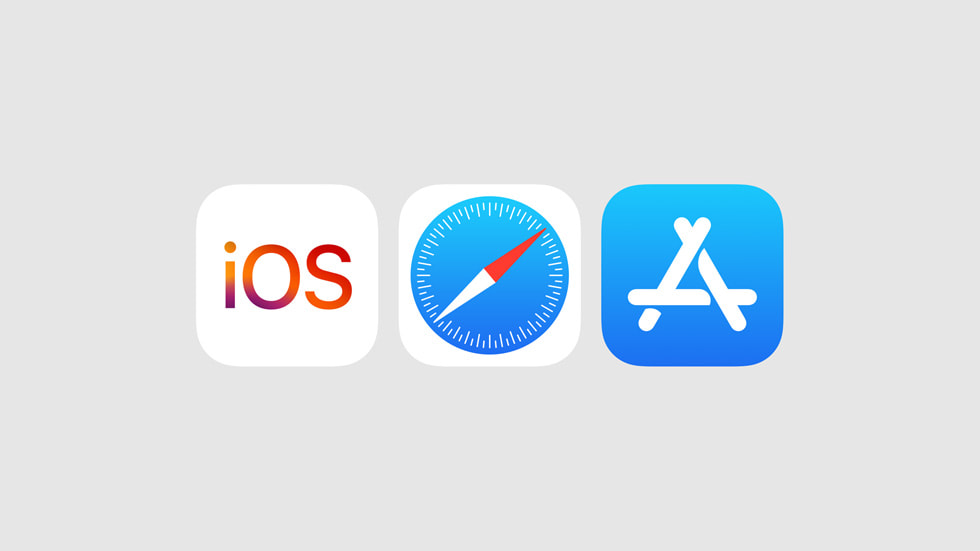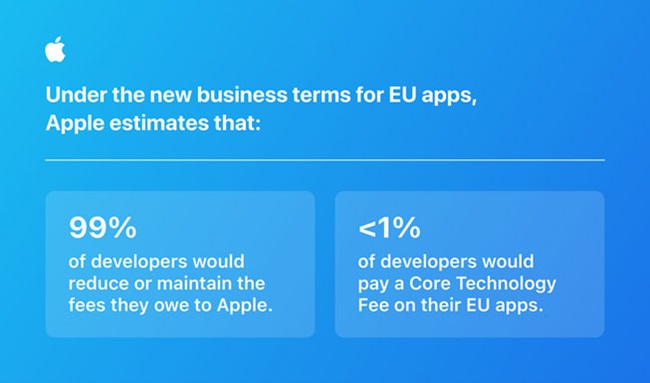
Apple has announced significant updates to iOS, Safari, and the App Store in the European Union (EU) to comply with the Digital Markets Act (DMA). These changes, aimed at improving the user experience, security, and privacy, are detailed below.
Changes to iOS in the EU
In the EU, Apple is making several modifications to iOS, introducing more than 600 new APIs for EU developers to comply with the DMA. These include:
- New App Distribution Options: Developers can distribute iOS apps through alternative app marketplaces, with provided frameworks and APIs for creating these marketplaces.
- Alternative Browser Engines: Developers can use browser engines other than WebKit for both browser and in-app browsing experiences.
- Interoperability Request Form: Developers can submit requests for interoperability with iPhone and iOS features.
Security Measures for iOS Apps
To address potential risks, Apple is implementing security measures for iOS apps in the EU, including:
- Notarisation for iOS Apps: A review process focusing on platform integrity and user protection.
- App Installation Sheets: Providing essential app information before download.
- Authorization for Marketplace Developers: Ensuring commitment to user and developer protection.
- Malware Protections: Preventing the launch of apps containing malware.
Changes to Safari
In response to DMA requirements, with the iOS 17.4 update, Apple introduces a choice screen in Safari for EU users to select a default browser from a list of options.
Apple mentioned that the screen also interrupts the initial experience of EU users when they open Safari to visit a webpage for the first time.
Updates to the App Store
For EU app developers, changes on the App Store include:
- New Payment Options: Developers can use payment service providers (PSPs) within their apps, with payment processing via link-out allowed.
- Business Planning Tools: Tools for developers to estimate fees and understand metrics related to Apple’s business terms.
- User Protections: App Store labels and disclosure sheets inform users about alternative payment processing. The system also involves App Review processes to ensure accurate communication. Expanded data portability options are available for users on Apple’s Data & Privacy site.
New Business Terms for Apps
Apple introduces new business terms for EU app developers, including:
- Reduced Commission: iOS apps pay 10% or 17% (after the first year) on digital transactions.
- Payment Processing Fee: An additional 3% for App Store payment processing; no extra cost for external providers.

- Core Tech Fee: €0.50 for each annual install over 1 million.
- Discount for Other Platforms: 3% off commissions for iPadOS, macOS, watchOS, and tvOS.
- Support Tools: Fee calculator and reports aid developers in assessing business impact.
Global App Experiences
Apple introduces new options for global app experiences:
- In-App Purchases: Mini-apps and games can use Apple’s In-App Purchase system for paid content or services.
- Guidelines: All experiences must follow App Store guidelines and maintain appropriate age ratings.
New App Analytics
Developers gain access to over 50 new analytics reports through the App Store Connect API, covering engagement, commerce, app usage, and frameworks usage. Analytics maintain user privacy, with developers having the ability to grant third-party access.
Flexibility for Sign-in Options
Developers offering third-party login services can now choose to offer Sign in with Apple or an equivalent privacy-focused login service, aligning with Apple’s commitment to user privacy.
Availability
These changes are set to roll out in March 2024 for users in the 27 EU countries. Developers can find more information and test these capabilities in the iOS 17.4 beta through the Apple Developer Support page.
Speaking about the upcoming changes, Phil Schiller, Apple Fellow, stated:
The changes we are unveiling today align with the stipulations of the Digital Markets Act in the European Union, aiming to safeguard EU users against the inevitable surge in privacy and security challenges accompanying this regulation. Our unwavering focus is on crafting the finest, most secure experience for our users in the EU and globally.
Developers now have the opportunity to explore the new tools and terms introduced for alternative app distribution and payment processing, enhanced features for alternative browser engines, contactless payments, and more. Crucially, developers retain the option to stick with the existing business terms if they so choose.
